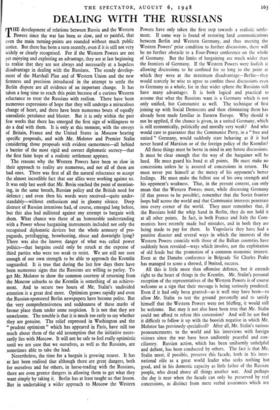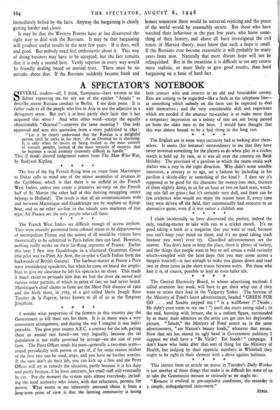DEALING WITH THE RUSSIANS
HE development of relations between Russia and the Western T Powers since the war has been so slow, and so painful, that even the main turning-points are rounded without much public notice. But there has been a turn recently, even if it is still not very widely or clearly recognised. For if the Western Powers are not yet enjoying and exploiting an advantage, they are at last beginning to realise that they are not always and necessarily at a hopeless disadvantage in dealing with the Russians. The steady develop- ment of the Marshall Plan and of Western Union and the new firmness and precision introduced in the attempt to settle the Berlin dispute are all evidence of an important change. It has taken a long time to reach this point because of a curious Western reluctance to treat the Russians with realism. There have been numerous expressions of hope that they will undergo a miraculous change of heart, and there have been numerous bouts of equally unrealistic petulance and bluster. But it is only within the past few weeks that there has emerged the first sign of willingness to do a deal with them. It is only at this moment, with the envoys of Britain, France and the United States in Moscow bearing specific proposals, and with Mr. Molotov and Premier Stalin considering those proposals with evident earnestness—all behind a barrier of the most rigid and correct diplomatic secrecy—that the first faint hope of a realistic settlement appears.
The reasons why the Western Powers have been so slow in their approach to reality are numerous, and not all of them are bad ones. There was first of all the natural reluctance to accept the almost incredible fact that our allies were working against us. It was only last week that Mx. Bevin reached the point of mention- ing, in the same breath, Russian policy and the British need for defence ; and even then his words were received—quite under- standably—without enthusiasm and in gloomy silence. Deep distrust of Russian intentions had, of course, emerged long before, but this also had militated against any attempt to bargain with them. What chance was there of an honourable understanding with a Power whose bargaining instruments included not only the recognised diplomatic devices but the whole armoury of pro- paganda, pettifogging, browbeating, abuse and downright lying? There was also the known danger of what was called power politics—that bargains could only be struck at the expense of third parties who were too weak to resist. We are still not sure enough of our own strength to be able to approach the Kremlin unguarded. It is true that during the last few days there have been numerous signs that the Russians are willing to parley. To get Mr. Molotov to show the common courtesy of returning from the Moscow suburbs to the Kremlin is something of an achieve- ment. And to secure two hours of Mr. Stalin's undivided attention is a great deal more. Optimism grows rapidly and even the Russian-sponsored Berlin newspapers have become polite. But the very comprehensiveness and suddenness of these marks of favour place them under some suspicion. It is not that they are unwelcome. The trouble is that it is much too early to say whether they are genuine. The relief expressed in Washington and the " prudent optimism " which has appeared in Paris, have still too much about them of the old assumption that the initiative neces- sarily lies with Moscow. It will not be safe to feel really optimistic until we are sure that we ourselves, as well as the Russians, are sometimes able to take the lead.
Nevertheless, the time for a bargain is growing nearer. It has at last been realised that although there are great dangers, both for ourselves and for others, in horse-trading with the Russians, there are even greater dangers in allowing them to get what they want simply by taking it. Berlin has at least taught us that lesson. But in undertaking a wider approach to Moscow the Western Powers have only taken the first step towards a realistic settle- ment. If some way is found of restoring land communications between Berlin and Western Germany, and thus meeting the Western Powers' prior condition to further discussions, there will be no further obstacle to a Four-Power conference on the whole of Germany. But the limits of bargaining are much wider than the frontiers of Germany. If the Western Powers were foolish in allowing discussions to be confined for so long to the point at which they were at the maximum disadvantage—Berlin—they would scarcely be wise to agree to confine those discussions even to Germany as a whole, for in that wider sphere the Russians still have many advantages. It is both logical and practical to assume that what the Russians want is a Germany which is not• only unified, but Communist as well. The technique of first joining up with Social Democrats and then eliminating them has already been made familiar in Eastern Europe. Why should it not be applied, if the chance is given, in a united Germany, which is still economically, politically and morally very weak? And who would care to guarantee that the Communist Party, in a " free and united " Germany, would suddenly start behaving as if it had never heard of Marxism or of the foreign policy of the Kremlin?
All these things must be borne in mind in any future discussions. It must be clear enough that the way of the bargainer will be hard. He must guard his hand at all points. He must make no concessions unless he is assured of concessions in return. He must never put himself at the mercy of his opponent's better feelings. He must make the fullest use of his own strength and his opponent's weakness. That, in the present context, can only mean that the Western Powers must, while discussing Germany (if that proves to be possible), remember that the Soviet frontier loops half across the world and that Communist interests penetrate into every corner of the world. They must remember that, if the Russians hold the whip hand in Berlin, they do not hold it at all other points. In fact, in both France and Italy the Com- munists have recently made bad mistakes, and in both they are being made to pay for them. In Yugoslavia they have had a positive disaster and several ways in which the interests of the Western Powers coincide with those of the Balkan countries have suddenly been revealed—ways which involve, not the exploitation of old feuds but the promotion of a common economic interest. Even at the Danube conference in Belgrade Sir Charles Peake has managed to score a shrewd, if limited, success.
All this is little more than offensive defence, but it extends right to the heart of things in the Kremlin. Mr. Stalin's personal reception of the representatives of the Western Powers is of course welcome as a sign that their message is being seriously pondered. Even if it had only been granted—as it well may have been—to allow Mr. Stalin to test the ground personally and to satisfy himself that the Western Powers were not bluffing, it would still be welcome. But may it not also have been true that Mr. Stalin could not afford to refuse this concession? And will he not find it difficult to follow it up with the boorish negative in which Mr. Molotov has previously specialised? After all, Mr. Stalin's various pronouncements to the world and his interviews with foreign visitors since the war have been uniformly peaceful and con- ciliatory. Russian action, which has been uniformly unhelpful and defiant, has been conducted by others. The fact is that Mr. Stalin must, if possible, preserve this • facade, both in his inter- national role as a great world leader who seeks nothing but good, and in his domestic capacity as little father of the Russian people, who dread above all things another war. And perhaps the day is near when the facade can only be preserved by real concessions, as distinct from mere verbal assurances which are immediately belied by the facts. Anyway the bargaining is clearly getting harder and closer.
It may be that the Western Powers have at last discovered the right way to deal with the Russians. It may be that bargaining will produce useful results in the next few years. If it does, well and good. But nobody need feel enthusiastic about it. This way of doing business may have to be accepted, but the fact remains that it is only a second best. Vastly superior in every way would be friendly dealing based on mutual trust. There must be no mistake about that. If the Russians suddenly became frank and honest tomorrow there would be universal rejoicing and the peace of the world would be reasonably secure. But those who have watched their behaviour in the past few years, who know some- thing of their history, and above all have investigated the evil tenets of Marxist theory, must know that such a hope is small. If the Russians ever become reasonable it will probably be many years from now. Naturally that more distant hope will not be relinquished. But in the meantime it is difficult to see any course more realistic, or more likely to give good results, than bard bargaining on a basis of hard fact.



































 Previous page
Previous page